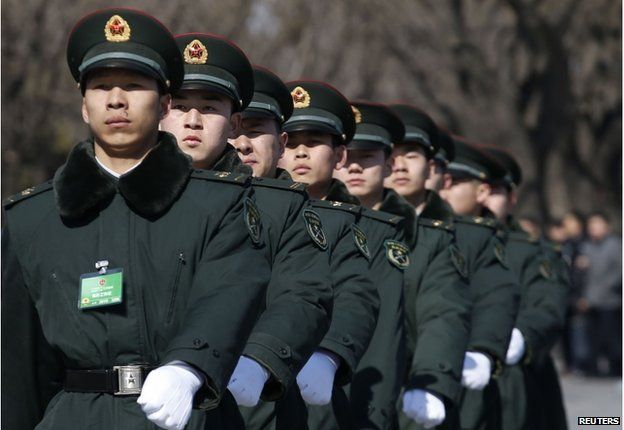Budget boost for China's military comes with shake-up
- Published

China's National People's Congress will open in Beijing on Thursday. Three thousand or so delegates from around the country will converge on Tiananmen Square, to take part in the annual political gathering.
Around one in 10 of those climbing the steps of the Great Hall of the People tomorrow will be in military uniform, representing the People's Liberation Army (PLA) - the world's largest.
They will form the single biggest contingent at the Congress. Their presence is a reminder to everyone in the hall, and to those watching outside, that the army serves the party.
That relationship is explicit in the oath every soldier swears and in the constitution: Xi Jinping is president and general secretary of the party but also chairman of the Central Military Commission - China's supreme military body. But recently the supremacy of the Party has needed to be reaffirmed - not once but several times since Xi Jinping came to power.
In January the military leadership publically reiterated its "commitment to the absolute leadership of the Communist Party" and its ambition to "forge the soul" of the armed forces so that officers and soldiers would follow the party's demands.
It might seem strange that the army should need to restate its allegiance at this time, but there are a couple of reasons why the party might feel it to be necessary.
Corruption crackdown
The military - along with the party as a whole, has experienced Xi Jinping's sweeping anti-corruption campaign. On Tuesday the names of 14 generals were released who have been investigated or convicted for corruption.
Among them is Xu Caihou, former vice-chairman of the Central Military Commission - the highest ranking soldier ever prosecuted. At the same time Reuters reported that Guo Boxiong, another vice chairman, is also under investigation.
In an army of two million, 14 names might not seem much, but it represents the biggest purge in a generation.
The anti-corruption campaign has also struck hard at the practice of buying promotions, particularly prevalent in those parts of the military dealing with procurement or managing some of the PLA's vast property and commercial concerns.
Officers would bribe superiors to obtain the most lucrative positions - those with the best prospects for racketeering - which could then be sold on before promotion or retirement from the army. Sums equivalent to 20 years of official salary are thought to have changed hands for the most prized commands.
The anti-corruption campaign has now left substantial numbers of officers who bought their posts holding debt, with neither the opportunity to earn extra money nor the ability to sell on their job.
In the words of one military observer - "it's as if a massive pyramid scheme has collapsed - and it's left a lot of very angry people".
Maintaining control
Grumpy officers are always a risk but there is another reason why party supremacy might be so important.
In recent years, as the PLA has modernised its training and equipment, the concept of a modern national army - loyal to the country rather than the party - has also begun to be discussed.
It might not seem revolutionary that the PLA would simply serve the people, but for the communist leadership it represents a threat. The PLA, at the last resort, underwrites the Communist Party's hold on power (most famously at Tiananmen Square in 1989). Any notion that the army would not side with the party needs to be stamped out.
So at the beginning of the year, the PLA's general political department issued a circular which announced that all combat officers should swap places with political commissars. Every unit at company level and above in the PLA has a political officer whose role is to implement party decisions and to provide political education to soldiers.
If carried out in full (a big question), it would represent one of the largest reshuffles in military history. It would also appear to mean that party discipline within the army is so important that the leadership is willing, at least for a while, to sacrifice a degree of operational capacity in the armed forces to get their house in order. Political officers are experts in Marxist-Leninist theory, not in commanding infantry.
Xi Jinping has spent his first two years as leader consolidating his power in the Party and tightening his control over all areas of government. Now he is making sure that the army is unquestionably his to command.